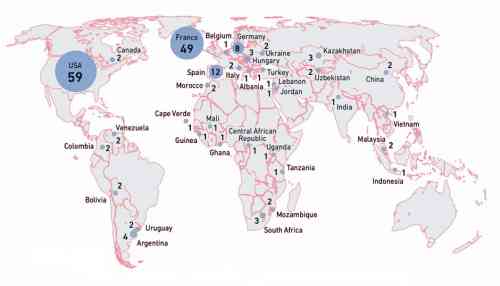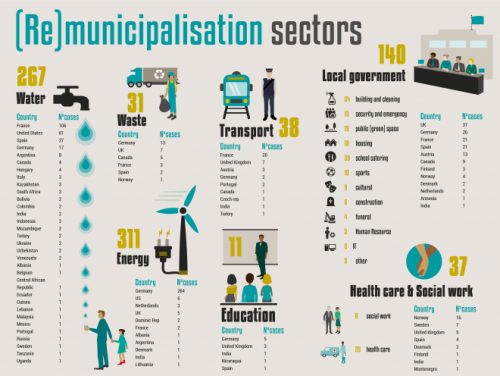A brief history of Disaster Capitalism
Gov. Ricardo Roselló of Puerto Rico is on a mission to privatize the island.
At the center of this effort is Puerto Rico’s bankrupt public power utility, known as PREPA. What most people don't know is that PREPA was already partially privatized.
In the mid-1990s, the administration of Gov. Pedro Rosselló – father of the current governor – began privatizing Puerto Rican services like telecomms, water, education and electricity. Thirty percent of the island’s power generation was sold to private coal and gas interests, among them the now defunct energy company Enron.
PREPA – which during its mid-century glory days was a source of Puerto Rican national pride – began a downward spiral. Its debt tripled from around US$3 billion in the 1990s to roughly $10 billion today. In recent years, austerity measures resulting from Puerto Rico’s financial crisis have further decimated PREPA.
This isn't even the worst example of privatization for Puerto Rico. That award belongs to Puerto Rico Aqueduct and Sewer Authority (PRASA), which also became private in 1995. The privatization of PRASA was such a failure that Puerto Rico has to re-nationalize it.
the contract was cut prematurely short. Citing “economic realities very different from initial projections,” Ondeo asked for an additional $93 million. Disappointed with Ondeo’s failure to 1) improve access to water in all communities, 2) meet EPA standards, 3) improve infrastructure, and 4) balance the budget, PRASA asked them to leave instead.
They aren't just looking to privatize utilities and infrastructure. They are looking to privatize the school system. The mayor of San Juan, Carmen Yulín Cruz, when addressing this development said:
The local government of Puerto Rico has introduced the concept of charter schools and has said that it’s going to privatize schools. It almost seems like the perfect storm for disaster economics or what they call disaster capitalism. Everything seems to be out there for sale,
Where would they get the idea of privatizing the school system in the wake of a hurricane disaster? New Orleans. You may have not known that turning the New Orleans public school system into a charter system was a huge success.
According to the Cowen Institute at Tulane University, 93 percent of New Orleans public school students attended charter schools in the 2014-15 school year — the highest proportion in the country.
...Supporters of the reforms have pointed to improved student test scores and graduation rates as an indication that the overhaul was a success. As Jonathan Chait of New York magazine wrote Monday, the reforms “have produced spectacular results.”
Spectacular results! Except that even the NY Times could see through this bullsh*t.
It starts with the fact that the public housing in New Orleans was largely destroyed and not rebuilt, so the poorest kids never came back.
Following the storm, some 7,500 unionized teachers and other school employees were put on unpaid leave, and eventually dismissed.
...There is also growing evidence that the reforms have come at the expense of the city’s most disadvantaged children, who often disappear from school entirely and, thus, are no longer included in the data.
There were some pretty nefarious things done in the pursuit of academic gain,” Mr. Perry acknowledged, including “suspensions, pushouts, skimming, counseling out, and not handling special needs kids well.”
...Consider Joseph S. Clark Preparatory High School, one of the city’s last traditional public schools to be “taken over.” Most of its 366 students declined to re-enroll when it reopened under new management in the fall of 2011. During its first year under FirstLine, a charter management organization, Clark had only 117 “persisters,” or returning students, according to a study by Stanford University’s Center for Research on Education Outcomes, known as Credo. FirstLine could not account for where the students went after they left Clark. However, Jay Altman, its chief executive, told me in an email that before FirstLine took over, a similarly low proportion of students, about 35 percent, were returning.
What happened to all those poor kids? Who knows, as long as the good numbers go up and the bad numbers go down.
Hurray for capitalism! It found a solution - fire the troublemakers.
The only difference this time is that the troublemakers are children.
And that doesn't even address the fact that the schools are run like prisons, and the non-union teaching staff unhappy and quitting.
The "solution" had nothing to do with the public good, which shouldn't be a surprise because capitalism is built upon the premise that everyone is out for themselves.
It's predictable that poor children would be kicked to the curb.
It doesn't require a hurricane for Disaster Capitalism to apply.
Sometimes all it takes is a financial crisis. Today's example is Greece.
Just in the past year, 14 major regional Greek airports were privatized, as was the port of Piraeus, Greece’s largest port and one of the largest in Europe. More recently, the port of Thessaloniki, Greece’s second-largest city, was also privatized to a consortium of investors. In addition, special privatization funds have been created where the ownership of public assets such as water utilities has been transferred, leading up to their future sale.
Very recently, we saw that despite the Supreme Court decision that we had back in 2014 that prohibits the privatization of water services in Greece – ruling that it is unconstitutional – we have this recent development in which both EYDAP (the Athens water utility) and EYATH (the Thessaloniki water utility) were transferred entirely – and this is important to stress – to this new “Superfund,” which is the new European privatization fund agreed to between the Greek government and its creditors in the Third Memorandum.
Even the IMF now admits that Greece's debt is unpayable. So we aren't looking for an actual solution to the debt crisis, much less to the well-being of the Greek people.
So why even bother?
Profits. Big, big private profits.
Athanasiou said the country offered investment opportunities and that progress was being made in terms of the government's privatization program.
"We believe that (returns of) 15 percent and above can be achieved and we're talking risk-weighted returns, not just absolute returns," he said.
15% ROI in a nation in a deep depression should be a flashing red warning light.
As for the privatizing public water, well, that has a long history of failure all over the world, even in America.
A report by the Transnational Institute (TNI), Public Services International Research Unit and the Multinational Observatory suggests that 180 cities and communities in 35 countries, including Buenos Aires, Johannesburg, Paris, Accra, Berlin, La Paz, Maputo and Kuala Lumpur, have all “re-municipalised” their water systems in the past decade. More than 100 of the “returnees” were in the US and France, 14 in Africa and 12 in Latin America.

Private companies charge customers 80% more for water and 100% more for sewer.
A 2017 study found that 20% of privatization efforts since the 1990's ended with public utilities being re-nationalized.


Decades after Thatcher privatized water, rail, and energy in Britain, it is now generally accepted that privatization drives up prices without improving services.
A quick look at America's health industry will tell you why this is true everywhere.
According to the Council for Affordable Health Insurance, Medicare administrative costs are about one-third that of private health insurance..... Ronald DePinho, president of MD Anderson Cancer Center in Texas, made $1,845,000 in 2012. That's over ten times as much as the $170,000 made by the federal Medicare Administrator in 2010.


Comments
Doubting in the miracles of privatization
means doubting the miracles of capitalism.
Flawer'Duh privatized Voc Rehab.
And that was a total disaster.
Having dealt with Flawer'Duh's Voc Rehab system since '02 myself, I'd say disaster was an understatement. And Rick Scott has spent his entire tenure slashing disability services to the point where they're not able to help with much of anything with regards to employment. Counselors are over-worked and grossly underpaid on top of it all.
Modern education is little more than toeing the line for the capitalist pigs.
Guerrilla Liberalism won't liberate the US or the world from the iron fist of capital.
'We' have a lot to relearn.
The motivation behind privatization is always profits. The societal purpose it claims to serve is a marketing strategy, nothing more.
Those 'costly' problem students (in the case of privatized for-profit schools) will always be neglected (as sacrificial lambs to the capitalist gods of cost-effectiveness and private profit).
The more costly regions/sectors (as with privatized transportation infrastructure, privatized utilities, law enforcement, emergency services etc.) would also be neglected due to cost-effectiveness (or lack thereof).
People have lived through the kind of privatization that Neofeudalism is bringing (within the Old World feudalism of the Middle Ages). I just hope it doesn't take 500 years for people to relearn the reasons why it doesn't work.
Mike Taylor
follow the money...
They lust for privatized schools because there's a big pile of cash there...online versions provide a crummy education with a large profit.
https://www.edweek.org/ew/projects/rewarding-failure-cyber-charter-inves...
And poor Puerto Rico. Control them with debt and then privatize them...
https://theintercept.com/2018/02/21/citigroup-citi-puerto-rico-debt/
And Haiti is even more abused.
https://www.democraticunderground.com/discuss/duboard.php
Capitalism fails to support people or planet...just profit. Thanks for the essay, as a retired teacher I've been fighting privatization for many years. We still don't have charter school legislation in Alabama but they are really working hard to bring it about. We do have private prisons however.
“Until justice rolls down like water and righteousness like a mighty stream.”
Everything that was a public service
is not an opportunity for a capitalist to prey on his fellow man for a billion bucks or two.
"Religion is what keeps the poor from murdering the rich."--Napoleon
Thanks 4 further confirmation of the importance of institutions
I have this diary up about how institutions overrule citizens.
Your OP is just a textbook example of how bought-and-paid-for corporatist government is looting everything in sight - despite the fact that privatizing utilities is a proven loser.
Of course, the privatizers make their money on the way in, and the taxpayer has to pay again to clean up the disaster.
Meanwhile, the
Libertariansbarbarians at Zero Hedge are on about how access to water isn't a right and water is just a resource that needs to be priced right. Next, after Trump's destruction of the EPA lets the US have Chinese level air pollution, the barbarians will tell me that air is just another resource.